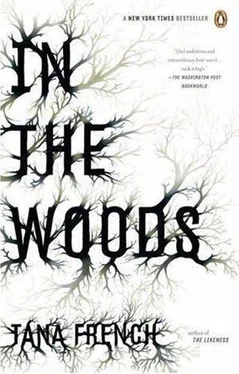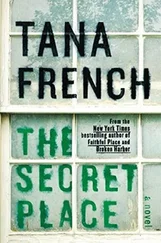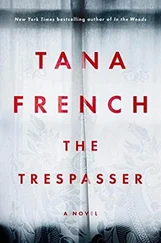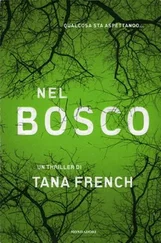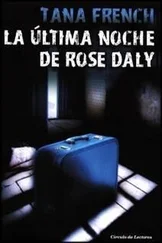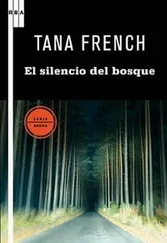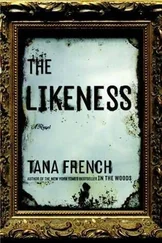"There was one under the table," Sam said. "Here-" He threw Cassie the last lid, and she fitted it into place and straightened up.
We stood under the fluorescent lights and looked at one another, across the bare tables and the litter of boxes. My turn to make dinner … For a moment I almost said it, and I felt the same thought cross both Sam's and Cassie's minds, stupid and impossible and no less piercing for any of that.
"Well," Cassie said quietly, on a long breath. She glanced around the empty room, wiping her hands on the sides of her jeans. "Well, I guess that's it, then."
* * *
I am intensely aware, by the way, that this story does not show me in a particularly flattering light. I am aware that, within an impressively short time of meeting me, Rosalind had me coming to heel like a well-trained dog: running up and down stairs to bring her coffee, nodding along while she bitched about my partner, imagining like some starstruck teenager that she was a kindred soul. But before you decide to despise me too thoroughly, consider this: she fooled you, too. You had as good a chance as I did. I told you everything I saw, as I saw it at the time. And if that was in itself deceptive, remember, I told you that, too: I warned you, right from the beginning, that I lie.
It is difficult for me to describe the degree of horror and self-loathing inspired by the realization that Rosalind had suckered me. I'm sure Cassie would have said that my gullibility was only natural, that all the other liars and criminals I'd encountered had been mere amateurs while Rosalind was the real, the natural-born thing, and that she herself had been immune purely because she had fallen for the same technique once before; but Cassie wasn't there. A few days after we closed the case, O'Kelly told me that until the verdicts came in I would be working out of the main detective unit in Harcourt Street-"away from anything you can fuck up," as he put it, and I found it difficult to counter this. I was still officially on the Murder squad, so nobody knew exactly what I was supposed to be doing in the general unit. They gave me a desk and occasionally O'Kelly sent over a pile of bureaucracy, but for the most part I was free to wander the corridors as I chose, eavesdropping on fragments of conversation and evading curious stares, immaterial and unwanted as a ghost.
I spent sleepless nights conjuring up gory, detailed, improbable fates for Rosalind. I wanted her not just dead but obliterated from the face of the earth-crushed to unidentifiable pulp, pulverized in a shredder, burned to a handful of toxic ash. I had never suspected myself of this capacity for sadism, and it horrified me further to realize that I would joyfully have carried out any of these sentences myself. Every conversation I had had with her spooled over and over through my head, and I saw with merciless clarity how skillfully she had played me: how unerringly she had put her finger on everything from my vanities through my griefs through my deepest hidden fears, and drawn them out of me to work her will.
This was, in the end, the most hideous realization of all: Rosalind had not, after all, implanted a microchip behind my ear or drugged me into submission. I had broken every vow myself and steered every boat to shipwreck with my own hand. She had simply, like any good craftswoman, used what came her way. Almost with a glance she had assessed me and Cassie to the bone and discarded Cassie as unusable; but in me she had seen something, some subtle but fundamental quality, that made me worth keeping.
* * *
I didn't testify at Damien's trial. Too risky, the prosecutor said: there was too much of a chance that Rosalind had told Damien about my "personal history," as he put it. He was a guy named Mathews who wears flashy ties and gets called "dynamic" a lot, and he always makes me tired. Rosalind hadn't brought up the subject again-apparently Cassie had been convincing enough to make her drop it and move on to other, more promising weapons-and I doubted that she would have told Damien anything useful at all, but I didn't bother to argue.
I went to see Cassie testify, though. I sat at the back of the courtroom, which was, unusually, packed; the trial had been filling front pages and talk radio since before it even began. Cassie was wearing a neat little dove-gray suit and her curls were slicked down smoothly against her head. I hadn't seen her in a few months. She looked thinner, more subdued; the quicksilver mobility I associate with her was gone, and her new stillness brought her face home to me-the delicate, marked arches above her eyelids, the wide clean curves of her mouth-as if I had never seen it before. She was older, no longer the wicked limber girl with the stalled Vespa, but no less beautiful to me for that: whatever elliptical beauty Cassie possesses has always lain not in the vulnerable planes of color and texture but deeper, in the polished contours of her bones. I watched her on the stand in that unfamiliar suit and thought of the soft hairs at the back of her neck, warm and smelling of sun, and it seemed an impossible thing to me, it seemed the vastest and saddest miracle of my life: I touched her hair, once.
She was good; Cassie has always been good in the courtroom. Juries trust her and she holds their attention, which is harder than it sounds, especially in a long trial. She answered Mathews's questions in a quiet, clear voice, her hands folded in her lap. On cross-examination she did what she could for Damien: yes, he had appeared agitated and confused; yes, he had seemed genuinely to believe that the murder had been necessary to protect Rosalind and Jessica Devlin; yes, in her opinion he had been under Rosalind's influence and had committed the crime at her urging. Damien huddled in his seat and stared at her like a little boy watching a horror movie, his eyes dazed and huge and uncomprehending. He had tried to commit suicide, using the time-honored prison bedsheet, when he heard that Rosalind was going to testify against him.
"When Damien confessed to this crime," the defense barrister asked, "did he tell you why he had committed it?"
Cassie shook her head. "Not that day, no. My partner and I asked him about his motive a number of times, but he either refused to answer or said that he wasn't sure."
"Even though he had already confessed, and telling you his motive couldn't possibly have done him any harm. Why do you think that was?"
"Objection: calls for speculation…"
My partner. I knew from Cassie's blink on the word, from the tiny shift in the angle of her shoulders, that she had seen me tucked away there at the back; but she never looked my way, not even when the lawyers finally finished with her and she stepped down from the stand and walked out of the courtroom. I thought of Kiernan then; of what it must have been to him when, after thirty years of partnership, McCabe had that heart attack and died. More than I have ever envied anything in the world, I envied Kiernan that, that unique and unattainable grief.
Rosalind was the next witness. She tiptoed up to the stand, through the sudden flurry of whispers and journalistic scribbling, and gave Mathews a timid little rosebud smile from under her mascara. I left. I read it in the newspapers the next day: how she had sobbed when she talked about Katy, trembled as she recounted how Damien had threatened to kill her sisters if she broke up with him; how, when his barrister started digging, she had cried, "How dare you! I loved my sister!" and then fainted, forcing the judge to adjourn the court for the afternoon.
She hadn't had a trial-her parents' decision, I'm sure, rather than hers; left to herself, I can't imagine she would have passed up that amount of attention. Mathews had plea-bargained her case. Conspiracy charges are notoriously difficult to prove; there was no hard evidence against Rosalind, her confession was inadmissible and she had of course recanted it anyway (Cassie, she explained, had terrified it out of her by making throat-slitting motions); and, besides, as a juvenile she wouldn't get much of a sentence even if by some chance she were found guilty. She was also claiming, off and on, that she and I had slept together, which left O'Kelly apoplectic and me even more so and brought the general confusion to a level nothing short of paralyzing.
Читать дальше
